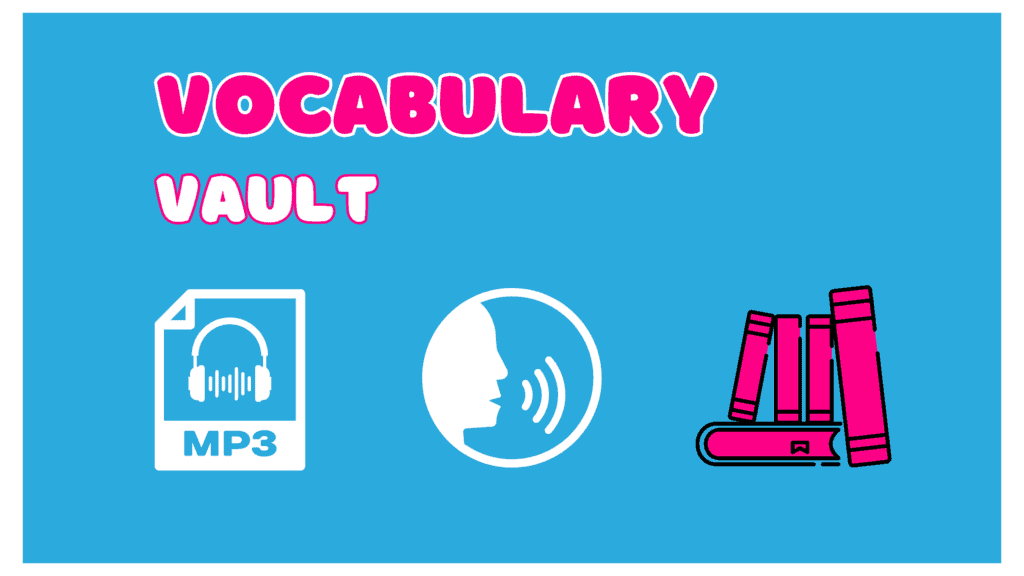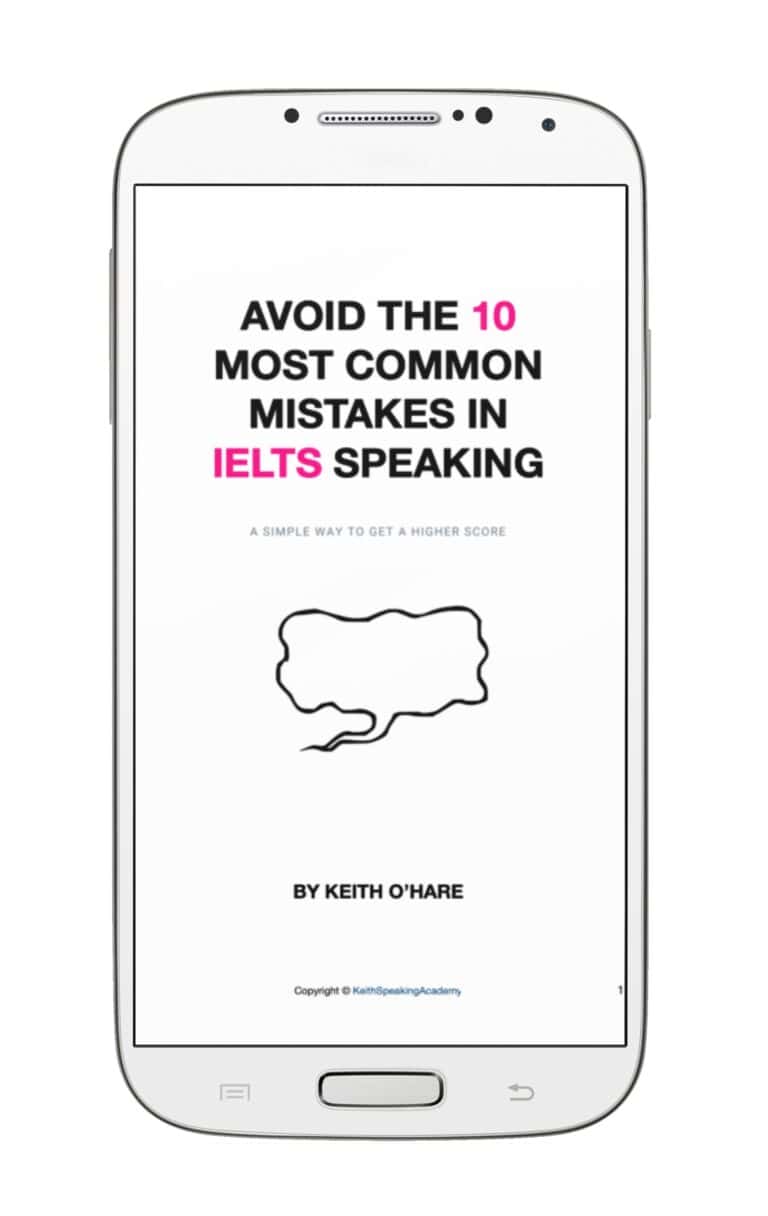IELTS Speaking Lesson about Artificial Intelligence (A.I.)
👇 Take this lesson with you! 👇
Table of Contents
IELTS Speaking Vocabulary: Artificial Intelligence
Artificial Intelligence (n. C / U) /ˌɑː tɪ fɪʃəl ɪnˈtel ɪ dʒəns/ = The simulation of human intelligence by machines Artificial intelligence can help us ____
- learn English
- do research
- search the Internet
If something is operated by AI, it is…
- AI-driven
- AI-powered
- AI-controlled
AI-driven tools are becoming more and more popular
Algorithm (n. C) /ˈæl ɡə rɪ ðəm/ = A set of instructions given to an AI system to help it learn from data
Algorithms are used widely in ______
- Marketing
- Social media
- Netflix
- Designing websites
Automate (v.) /ˈɔː tə meɪt/ = to make a process automatic by having machines do it
A.I. can help us automate a lot of jobs, such as analysing big data
Automatic (adj.) /ɔː təˈmæt ɪk/ = works by itself without human direction
I have an automatic car because I don’t like cars with a gear stick.
Autonomous (Adj.) /ɔːˈtɒn ə məs/ = independent
Autonomous vehicles may become more popular in future
AI in Everyday Life: Examples
Where can you see A.I. in your everyday life?
- Searching the Internet
- Creating content (images, stories, videos)
- Getting help – virtual assistants (Alexa, Siri, chatbots)
- Algorithms for recommendation services (Netflix, Spotify, Amazon)
- Language translation
- Personalisation (social media, online learning, online shopping)
- Self-driving cars
- Route optimisation (Google maps)
IELTS Speaking Idioms: Artificial Intelligence

1. To be on autopilot = To use a system that operates automatically
I use Google maps so whenever I travel, my navigation is on autopilot
2. To open (a) Pandora’s box = to create a lot of unexpected problems
I am unsure about using A.I. in healthcare. I think it’s opening a Pandora’s box and will lead to ethical problems we are not ready for.
3. A slippery slope = a bad situation that will get worse
Relying on AI for hiring new recruits is a slippery slope that could lead to
more people being discriminated against.
4. To put the cart before the horse = to do things in the wrong order
I think using AI-driven teaching assistants before we understand their
impact on learning is a mistake. It’s putting the cart before the horse.
Other Idioms
Hold your horses = wait!
Child: I think we should buy the new iPhone
Parent: Hold your horses, we need to check the price first
Speaking and Listening: Pros and Cons of A.I.
Workplace and Education
Click the arrow to see the full script
Full Script
I reckon there are numerous benefits to AI.
I mean talking about AI in the workplace, I think it can help automate a lot of operations such as recruiting people, doing research, analysing documents and things like that.
I think there is a clear upside for students as well.
It can be a great tool to help with their research, so long as they’re not over-dependent on that and understand they have to adapt the results to their context.
As well as that, I think AI is becoming more and more powerful in education, to personalise learning.
So for example, if you want to learn a language there are apps now that use AI to adapt your learning to your level, to your mother tongue and to your context.
The big downside, as I mentioned, is over-dependence on AI, which is a slippery slope to us becoming very lazy and not making an effort to think and be creative.
And of course, there is the downside of privacy concerns, where AI-driven software may be using our personal data without consent.
IELTS Speaking Discussion: Ethical Considerations
3 Concerns of A.I.
Click the arrow to see the full script
Full Script
I think when it comes to ethics in AI, there are probably three things we need to bear in mind (=to consider, take into account)
The first is what they call bias in AI. And this is where AI discriminates against certain people.
It may be minority groups because the data it’s based on, is also discriminating against them.
So, for example, when companies are recruiting people, if they use AI to filter out (=to pick out, exclude) people, that can discriminate against certain groups.
The second thing, I think the second issue is privacy concerns.
When we’re using AI, you know, it’s gathering lots of data, it’s tracking almost everything you do. It’s quite scary, actually. But what happens to that data? How is it used? Who owns the data?
And I think these are important questions that we shouldn’t just leave it to the big AI companies to decide, but we have to make some rules and regulations on this.
Last but not least, I think, is the issue of job loss as we’re using AI more and more. Of course it’s great because it’s automating many jobs, many activities, makes us more productive, it’s cheaper, but also, a lot of people are going to lose their jobs.
And I think we just need to think about that and take measures to help them find a new job. How do we help them retrain and get employment in the future? So, for me, yeah, those are the three main ethical considerations of AI.
Pronunciation Files For Vocabulary From My Best Live Lessons
Use Words EASILY in English Conversations!
More Free Lessons
If you liked this lesson about music in IELTS Speaking, leave a comment below!
There are more lessons you can follow in the links below too.
TEAMWORK in IELTS Speaking Vocabulary and collocations to talk about teamwork
SINGING in IELTS Speaking. Vocabulary and collocations to talk about singing.
MEETING in IELTS Speaking. Useful collocations and vocabulary to help you discuss about meetings.
CHILDHOOD in IELTS Speaking Learn different activities children do, toys, changes in children nowadays.
JOBS in IELTS Speaking Vocabulary you need to answer questions in Part 1, 2 and 3 for the topic of jobs.



Thank you teacher , your lesson are very useful.
So pleased to hear that – thanks!